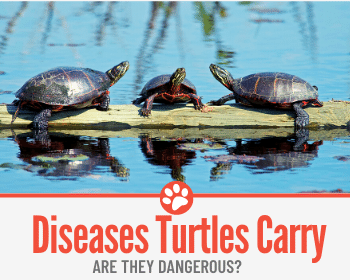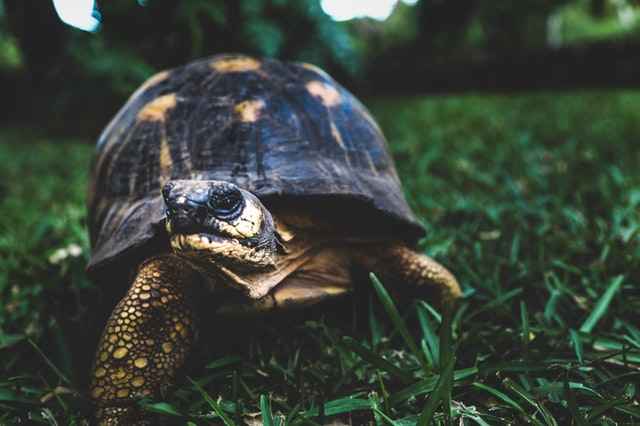 Turtles are one of the worlds most common and intelligent reptiles. With a hard shell to protect them from predators, it has evolved throughout millions of years!
Turtles are one of the worlds most common and intelligent reptiles. With a hard shell to protect them from predators, it has evolved throughout millions of years!
They live in almost every climate around the world, and throughout their evolution they have become extraordinarily complex.
Now however, a lot of turtles are house pets: this means you must be careful of the disease’s turtles can carry! There are two main types of turtles: wild turtles and baby turtles.
Like all creatures though, the turtle carries diseases which only they can have, and others which can affect you as well!
What Diseases do turtles carry? Are they dangerous?
Turtles are notorious for carrying salmonella. Fortunately, it is exceedingly rare people die from salmonella. Unfortunately, it is extremely easy to catch and can cause you to be hospitalized.
Children, pregnant women, old people and those with heath conditions are greatest at risk. Furthermore, studies show that the smaller turtles tend to be more of a risk with salmonella- so much so, that it is illegal to sell small turtles (around 4 inches big) in the USA!
Most reptiles carry salmonella, so it’s nothing to worry about. If you are hygienic around a turtle, washing your hands or wearing gloves, you are safe. Furthermore, turtles rarely carry other bacteria’s such as e-coli, but if they are kept in dirtier conditions it can happen.
Turtles do carry their own diseases which can’t be passed on such as nutritional diseases, where their shell can go soft. Furthermore, reproductive diseases can occur if they are not looked after well.
What are the chances of getting Salmonella from a turtle?
Remarkably high. In fact, 14 states in the USA had a Salmonella outbreak caused by turtles. Fortunately, nobody died yet 35 people were hospitalized (around 40 percent children).
Turtles carry salmonella on their shell and outer skin, therefore if you touch a turtle you are in contact with the disease.
Therefore, you should always wash your hands after handling a turtle, since the bacteria can stay on your hands for a few days.
Furthermore, symptoms of salmonella are seen after 72 hours and can last between 2 to 7 days! Most people with salmonella have diarrhoea and/or vomiting. Salmonella then is the main disease which turtles carry.

Do wild or baby turtles carry any diseases?
Yes. They carry diseases which only infect themselves such as nutritional diseases, respiratory diseases and shell fungi/bacteria. We will never catch these as they are non-communicable meaning they can’t be passed about!
You’re more likely though to catch a communicable disease such as salmonella from a baby turtle.
Therefore, they have been banned as pets in the USA, as they carry the most disease! Wild turtles carry salmonella as well, but your less likely to catch it from them.
They can, carry e coli. Although it is very rare and it is usually in small amounts, it is very easy to catch.
Can you get salmonella from touching turtles? Is it ok to touch a turtle?
Yes. Therefore, you must wash your hands and stay hygienic with a turtle. You must remember, turtles carry the disease on their shell and outer skin, which is the areas you are most likely to touch.
Don’t let a turtle crawl across your face or come in contact with your mouth. This will only make it riskier to catch the disease.
Furthermore, turtles can leave salmonella bacteria on surfaces they walk across. Common examples would be on a table, countertop or chair. Therefore, you should never allow a turtle into your kitchen!
You can easily get salmonella from a turtle without touching the turtle! If you touch a surface which it has touched, you are likely to get it.
Play with the turtle and explore it. Just be hygienic! Respect the turtle and keep your hands away from your face, mouth eyes etc after being in contact with a turtle!
How can I prevent my turtle from getting salmonella?
Unfortunately, this is ridiculously hard. Even if you clean your turtle regularly and keep it in the cleanest conditions, it can catch salmonella through its own droppings. This then can reach their bodies through tank water or natural habitats.
There are no real symptoms of salmonella for the turtle, and you will only find out once you get it.
Clean the tank regularly. Make sure that droppings are cleared very quickly and check the tank daily. This will reduce the risk for you and the turtle of catching salmonella. Furthermore, you do need to stay hygienic.
The more hygienic you are the less likely the both of you are to catch the disease. Don’t cramp the turtle in a small tank as this will increase the risks!
Clean the tank in an area away from a bathroom or a kitchen sink! Have a dedicated area to clean the tank and use disinfectant and bleach.
How do you know if a turtle has salmonella? How can you tell?
This is extremely hard. Turtles do not have many symptoms like us, so really the only way to tell is to check its tank. If you see droppings in there, then you should prepare. You can consult a vet but, in most circumstances, they will tell you it is natural.
It isn’t deadly as such for the turtle, but for the human it can leave a few days of hell!
The only way to tell, is if you catch the disease. It is by far the most accurate way. Fortunately, by catching it you can put safety measures in place to protect other people who may live in your household.
Unfortunately, salmonella passes on very easily, so it is likely the whole household will have it before the safety measures are put in!
Chances of getting salmonella from a turtle.
Extremely high. They carry it on their shell and their outer skin. It is most likely you will be touching these areas when you have contact with the turtle. Furthermore, touching or eating from surfaces the turtle has touched, can lead you to get salmonella very easily!

Do turtles carry e coli?
Yes. It is exceedingly rare though. Some wild turtles can carry it by catching the disease out in the wild. Pet turtles can catch it only if they are kept in poor conditions. Baby turtles can also catch it through the water from another animal.
Communicable diseases which are transmitted in the water can be spread extremely far out!
If you think your turtle may have e coli, then you will need to consult a vet. It may have excess droppings, which again increases the risk of salmonella.
Studies show how body waste can carry e coli. This is mostly common in humans, cows, and goats. It is exceedingly rare that humans catch e coli from turtles, but it can happen.
It won’t be as deadly as e coli from other species as it is not as strong, but it will make you ill.
Common Turtle Diseases
Vitamin D related diseases can be common. The symptoms can be a softer shell and a lack of activity. Furthermore, shell diseases such as fungi can be common if the turtle is not maintained properly.
A turtle can also get respiratory diseases which can lead to deadly pneumonia. Furthermore, digestive diseases are common. Worms (spirochid trematodes) can be common and can make the turtle extremely ill and cause a lot of damage to the stomach.
Of course, they carry salmonella. It is their most common communicable disease and the most common one to affect humans. They can rarely carry e coli, but a vet will tell you if a turtle has it or not at an early stage.
I do advise in keeping up to date with the vet, telling them about the turtle and what it eats and how often you clean it.
Always clean its food before it eats, as it could carry diseases such as e coli. Leaves and other greens are produced on farmland, where e coli is more common.
Do Wild Turtles Carry Salmonella?
Like all breeds, yes, they do. They are not exempt from the disease, as they can catch it through their droppings. They carry it on their outer skin and shell. It is natural for a turtle to carry salmonella like all reptiles do.
Wild turtles may also carry more of it, since some are not kept to high hygiene standards. If you see a turtle out in the wild; its best to just leave it alone, as touching it may lead to salmonella.
Are turtles harmful to humans?
Apart from salmonella, no. They will not try to eat you and they fear humans because of size difference. It has been exceedingly rare for a turtle to kill, however a 4-week-old baby in Florida did die due to salmonella from a baby turtle.
It has been highly suggested that turtles should not be kept if you have children under 5 and adults over 65 in the household. Furthermore, the salmonella can be very much a risk to those with health conditions such as HIV/AIDS.
In Conclusion:
Turtles are very calm animals. They will not try to kill you nor will they try to injure you like other reptiles. However, they do carry their diseases. Some only affect them and others such as the deadly salmonella affects humans too.
Both wild turtles and baby turtles carry salmonella. It is natural, and something you should not worry about, as it is natural. Reptiles do carry the disease.
Just be careful with pet turtles. Make sure they are kept in a clean environment, and they are maintained regularly. Clean their tank every week and be sure to wash your hands afterwards.
Keep it away from bathrooms and kitchens and avoid keeping a turtle as a pet if you have young children or old people living in the house. Turtles rarely kill, and when they do it is usually rare circumstances.
Never buy a turtle, as you never know how it has been kept. Instead adopt as it gives a guarantee that specialists have maintained the turtle and kept it safe and checked if it has any diseases whatsoever.






